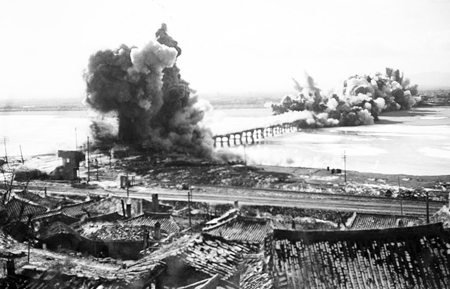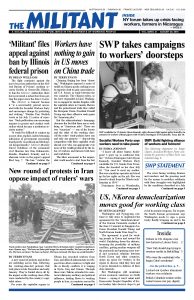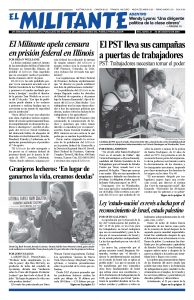Washington and Pyongyang continue to take steps to implement the agreement for the “denuclearization” of the Korean Peninsula reached at the June 12 summit in Singapore between President Donald Trump and North Korean leader Kim Jong Un.
The agreement is good for working people in Korea and around the world. Ratcheting down the rhetoric, lessening the possibility of military conflicts, getting nuclear weapons off the peninsula and opening more travel and economic relations between North Korea and other countries, opens up space for workers in the region to discuss what they face and to press demands in defense of their class interests.
But Washington still maintains severe economic sanctions on North Korea — saying it won’t relent until Democratic People’s Republic of Korea leaders take decisive steps to get rid of its nuclear weapons. For its part, the North Korean government says Washington needs to sign a peace treaty finally bringing an end to the 1950-53 Korean War.
Both governments occasionally hurl invective at each other, but this is mostly a negotiating ploy.
The North Korean government has not tested a nuclear weapon or long-range missile since last November. Leading up to the summit it destroyed its Punggye-ri nuclear testing site. It has also begun dismantling its Sohae Satellite Launching Station, according to media reports July 23.
Washington has made moves to de-escalate. Right after the summit, President Trump suspended annual U.S.-South Korean war games, which he admitted were “provocative.”
On Aug. 1, Vice President Mike Pence and Adm. Phil Davidson, top commander of U.S. forces in Asia, received 55 caskets containing remains of missing U.S. soldiers that were handed over by the North Korean military, 65 years after the signing of an armistice at the end of the Korean War.
The U.S. Defense Department announced the next day that talks are being organized to restart joint U.S.-North Korean teams to search for more remains. Some 5,300 missing soldiers are believed to have died in the North. The U.S. government suspended such teams in 2005.
In response to this, and a “nice” letter he received from North Korean leader Kim Jong Un, President Trump thanked Kim “for keeping your word,” adding, “I look forward to seeing you soon!”
With the defeat of the Japanese empire in the second world imperialist war, working people in Korea accelerated their decadeslong revolutionary struggle against Japanese subjugation of their country. They fought for land reform, trade union rights, expropriation of factories and women’s suffrage. And they formed their own government.
U.S. imperialism split Korea in two
Washington rapidly sent troops, in collaboration with Moscow, to divide the country and occupy the South. They put the U.S. military in power and set out to crush the workers and farmers. While working people in the North took power out of the hands of the capitalist class, the U.S. government moved to install the bloody regime of Syngman Rhee in the South.

As the Korean War exploded, Washington used its massive airpower to level almost every building in the North — and much of the South. The war was unpopular among workers in the U.S. “I am for the withdrawal of our troops from Korea,” John Anderson, president of the Detroit Fleetwood local, told the 1951 United Auto Workers convention. The Korean War, he said, “is to a large extent a civil war, a revolutionary war, such as the American people fought back in 1776 and our American Civil War.”
To the surprise of the U.S. rulers, Korean fighters — who they initially dismissed as “ignorant peasants” and expected to defeat in a matter of weeks — fought Washington to a stalemate. With the help of Chinese volunteers, they dealt U.S. imperialism its first military defeat.
In 1953 Washington agreed to an armistice. Four million people had been killed, including at least 2 million civilians.
Since then the U.S. rulers — Democratic and Republican administrations alike — have kept tens of thousands of troops, planes, missiles and warships in the South.
White House course on negotiations
Some political pundits are skeptical about the talks, especially liberal media bosses devoted to “resistance,” aimed at bringing down Donald Trump. They argue that the president is being duped by Kim and selling out the U.S. They act as if a new war would be preferable.
In an Aug. 1 editorial, the Washington Post complains, “There is no evidence that North Korea has changed direction.” The paper’s editors claim the summit produced “nothing concrete on nuclear weapons, just vague statements and undefined promises.”
Meanwhile, Washington — with key assistance from Beijing, North Korea’s main trading partner — is continuing to squeeze Pyongyang with punishing sanctions. The Treasury Department imposed penalties on Russia’s Agrosoyuz Commercial Bank Aug. 3, charging it was handling transactions for North Korea in violation of United Nations restrictions.
Sanctions bear down on workers
“Our sanctions will remain in place until we have achieved the final, fully verified denuclearization of North Korea,” Treasury Secretary Steven Mnuchin said.
The sanctions have increased the hardships for working people in the North, forcing the closure of factories and limiting the import of basic necessities. Since late July this has been exacerbated by a heat wave topping 104-degrees, threatening crops there.
Since the U.S. rulers occupied Korea in 1945, the Socialist Workers Party has demanded the immediate and unconditional withdrawal of all U.S. forces. Today the SWP demands Washington end all sanctions and get its “troops, ships, planes, and missile and radar systems out of Korea! For a Korean Peninsula, Japan and surrounding skies and waters free of nuclear weapons!
“Korea is one!”
As Washington-DPRK talks continue, these demands can win wider support from working people, who have no interest in being cannon fodder for U.S. imperialist interests.

